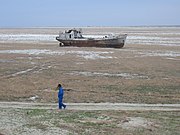User:Wiki User 68/My Portal/Selected natural history/1

Desertification is the degradation of land in arid and dry sub-humid areas, resulting primarily from natural activities and influenced by climatic variations. It is also a failure of the ecological succession process. A major impact of desertification is biodiversity loss and loss of productive capacity, for example, by transition from land dominated by shrublands to non-native grasslands. In the semi-arid regions of southern California, many coastal sage scrub and chaparral ecosystems have been replaced by non-native, invasive grasses due to the shortening of fire return intervals. This can create a monoculture of annual grass that cannot support the wide range of animals once found in the original ecosystem. In Madagascar's central highland plateau, 10% of the entire country has been lost to desertification due to slash and burn agriculture by indigenous peoples. In Africa, if current trends of soil degradation continue, the continent will be able to feed only 25% of its population by 2025, according to UNU's Ghana-based Institute for Natural Resources in Africa.[1] Globally, desertification claims a Nebraska-sized area of productive capacity each year.[2]
